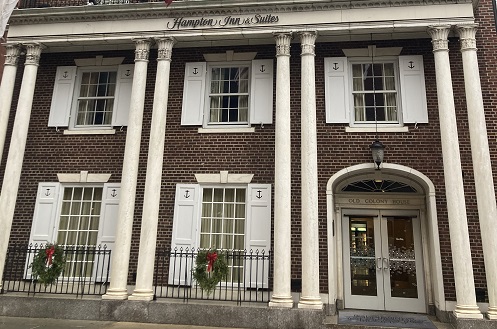
PROVIDENCE – There is growing support among hotel owners and managers for Providence and Warwick creating tourism-improvement districts to generate additional revenue for marketing and other efforts to boost the hospitality industry.
Providence’s finance committee on Dec. 12 is scheduled to vote on a resolution establishing the Providence Tourism Improvement District. If approved it would dedicate 2% of gross room rental revenue to a special fund overseen by a committee “composed of a majority of business owners, or their authorized representatives,” according to the resolution, which includes a five-year sunset.
The revenue would be folded into the annual budget of the Providence Warwick Convention & Visitors Bureau, allowing an expansion of its marketing efforts.
Farouk Rajab, general manager of the Providence Marriott, said that tight profit margins and the residual effects of the pandemic, including a lagging rebound of business travel, has made internal marketing drives difficult.
“We are very excited about the potential of the tourism district in Providence, which has been slower to recover than South County and Newport,” he said. “It is still in the bottom of the recovery scale.”
Rajab estimated that while leisure travel has returned to pre-pandemic levels, corporate and individual business travel to the Marriott remains between 30% to 40% of what it was in 2019.
“As hoteliers, we need to figure out creative ways to recover. And we believe this district is a tool to allow us to help us help ourselves,” he said. “Many hotels do not have the financial capabilities of doing any marketing these days.”
The 2% assessment on all lodging revenue would only apply to hotels with 50 or more rooms “existing and in the future” within the city limits and requires approval by the City Council.
The city has 2,950 hotel rooms within its borders. PWCVB has more recently been gauging the support of hotel owners in Warwick, where the campaign for the district remains in the planning stages, according to its CEO and president, Kristen Adamo.
But the initial reaction in Warwick has been positive.
Lynne Oscarson, general manager of Crowne Plaza Providence-Warwick, supports a separate district agreement and local committee for Warwick, given the distinction of the city’s travel and tourism economy from Providence, particularly in the off-season.
“This would be really important for the industry here,” she said. “And especially for international travel, which make up a large part of our travelers.”
Oscarson added that in her discussions with other hotel owners, enthusiasm is growing as they learn more about the potential benefits.
Adamo said the campaign in Warwick, while moving forward, might take longer to get to the finish line. Most of the hotels in Providence are locally controlled, while many in Warwick are corporate owned and require approval from national offices.
However, the PWCVB has gained buy-in from a number Warwick city officials and expects eventual approval, said Adamo.
“We are really proud of the support this has received from the hotels operators,” she said. “Especially since they are entrusting us to manage the funds.”
A document accompanying the resolution shows that 90% of the PTID revenue, approximately $1.6 million in the first year, goes toward advertising, marketing, sales and opportunity funding, with the remainder for administrative costs.
The initiative was made possible through the passage of the Tourism Improvement Districts Act by the General Assembly back in May. The law allows for the creation of special tourism districts in all Rhode Island municipalities “upon submission of a successful petition of the assessed business owners located within the boundaries of the district,” and requires 60% of impacted business owners to sign on in support.
A petition circulated among hotels in Providence was signed by more than 90% of hotels.
James Karam, principal with Exchange St. LLC and Chapel Hotel LLC, owners of the Hampton Inn & Suites and Homewood Suites by Hilton, said that in his experience tourism marketing districts have worked well in other cities, so long as the funds are properly managed.
“Tourism bureaus need to have funds to compete,” he said. “The money helps them to get out and market the city and create more opportunities for the hotels and restaurants.”
Karam cautioned that the economic boost can sometimes disproportionately benefit larger hotels, but the benefits trickle down to boutique hotels and other lodging operations.
“In our business that’s okay because it creates compression in the marketplace. The more rooms that get filled up, the more opportunities you have to get a decent rate for your hotel,” he said. “In these inflationary times that hotels are facing for labor and materials, increasing rates is really critical.”
A major selling point of the new district is revenue being overseen by the stakeholders themselves, rather than collected and distributed by a government entity.
“It’s a program that will be governed by the hoteliers,” said Rajab. “We have to try something new.”
(Christopher Allen is a PBN staff writer. You may contact him at Allen@PBN.com)












